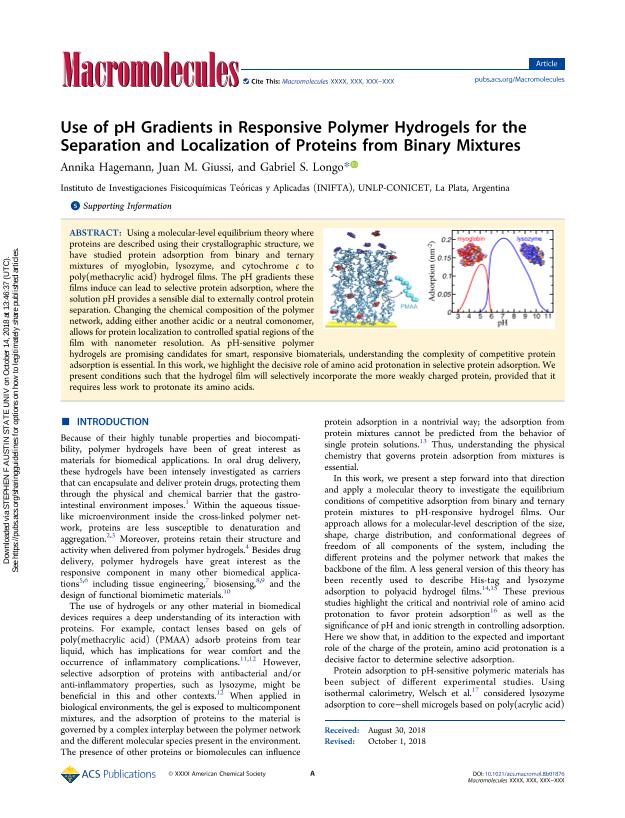Mostrar el registro sencillo del ítem
dc.contributor.author
Hagemann, Annika
dc.contributor.author
Giussi, Juan Martín

dc.contributor.author
Longo, Gabriel Sebastian

dc.date.available
2020-03-20T16:18:21Z
dc.date.issued
2018-10
dc.identifier.citation
Hagemann, Annika; Giussi, Juan Martín; Longo, Gabriel Sebastian; Use of pH Gradients in Responsive Polymer Hydrogels for the Separation and Localization of Proteins from Binary Mixtures; American Chemical Society; Macromolecules; 51; 20; 10-2018; 8205-8216
dc.identifier.issn
0024-9297
dc.identifier.uri
http://hdl.handle.net/11336/100408
dc.description.abstract
Using a molecular-level equilibrium theory where proteins are described using their crystallographic structure, we have studied protein adsorption from binary and ternary mixtures of myoglobin, lysozyme, and cytochrome c to poly(methacrylic acid) hydrogel films. The pH gradients these films induce can lead to selective protein adsorption, where the solution pH provides a sensible dial to externally control protein separation. Changing the chemical composition of the polymer network, adding either another acidic or a neutral comonomer, allows for protein localization to controlled spatial regions of the film with nanometer resolution. As pH-sensitive polymer hydrogels are promising candidates for smart, responsive biomaterials, understanding the complexity of competitive protein adsorption is essential. In this work, we highlight the decisive role of amino acid protonation in selective protein adsorption. We present conditions such that the hydrogel film will selectively incorporate the more weakly charged protein, provided that it requires less work to protonate its amino acids.
dc.format
application/pdf
dc.language.iso
eng
dc.publisher
American Chemical Society

dc.rights
info:eu-repo/semantics/openAccess
dc.rights.uri
https://creativecommons.org/licenses/by-nc-nd/2.5/ar/
dc.subject
pH-RESPONSIVE HYDROGEL FILMS
dc.subject
PROTEIN ADSORPTION
dc.subject
PROTEIN SEPARATION AND LOCALIZATION
dc.subject
COMPETITIVE PROTEIN ADSORPTION
dc.subject
PROTONATION
dc.subject
MOLECULAR MODELING
dc.subject
ACID-BASE EQUILIBRIUM
dc.subject.classification
Físico-Química, Ciencia de los Polímeros, Electroquímica

dc.subject.classification
Ciencias Químicas

dc.subject.classification
CIENCIAS NATURALES Y EXACTAS

dc.title
Use of pH Gradients in Responsive Polymer Hydrogels for the Separation and Localization of Proteins from Binary Mixtures
dc.type
info:eu-repo/semantics/article
dc.type
info:ar-repo/semantics/artículo
dc.type
info:eu-repo/semantics/publishedVersion
dc.date.updated
2020-03-16T13:59:12Z
dc.journal.volume
51
dc.journal.number
20
dc.journal.pagination
8205-8216
dc.journal.pais
Estados Unidos

dc.description.fil
Fil: Hagemann, Annika. Consejo Nacional de Investigaciones Científicas y Técnicas. Centro Científico Tecnológico Conicet - La Plata. Instituto de Investigaciones Fisicoquímicas Teóricas y Aplicadas. Universidad Nacional de La Plata. Facultad de Ciencias Exactas. Instituto de Investigaciones Fisicoquímicas Teóricas y Aplicadas; Argentina
dc.description.fil
Fil: Giussi, Juan Martín. Consejo Nacional de Investigaciones Científicas y Técnicas. Centro Científico Tecnológico Conicet - La Plata. Instituto de Investigaciones Fisicoquímicas Teóricas y Aplicadas. Universidad Nacional de La Plata. Facultad de Ciencias Exactas. Instituto de Investigaciones Fisicoquímicas Teóricas y Aplicadas; Argentina
dc.description.fil
Fil: Longo, Gabriel Sebastian. Consejo Nacional de Investigaciones Científicas y Técnicas. Centro Científico Tecnológico Conicet - La Plata. Instituto de Investigaciones Fisicoquímicas Teóricas y Aplicadas. Universidad Nacional de La Plata. Facultad de Ciencias Exactas. Instituto de Investigaciones Fisicoquímicas Teóricas y Aplicadas; Argentina
dc.journal.title
Macromolecules

dc.relation.alternativeid
info:eu-repo/semantics/altIdentifier/url/http://pubs.acs.org/doi/10.1021/acs.macromol.8b01876
dc.relation.alternativeid
info:eu-repo/semantics/altIdentifier/doi/http://dx.doi.org/10.1021/acs.macromol.8b01876
Archivos asociados
